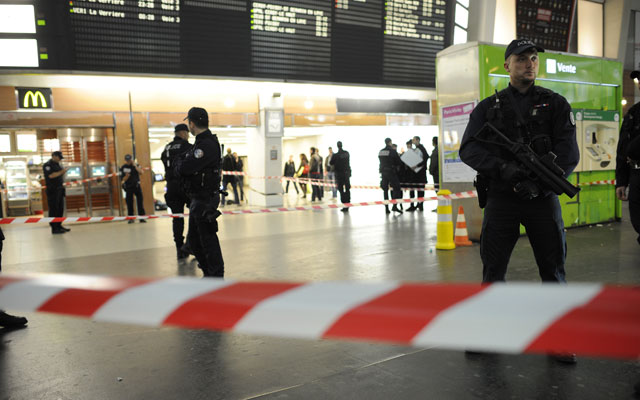Shortly before 6 p.m. last Saturday, French soldier Cedric Cordier was patrolling the underground arcade of bustling shops beneath the famed La Grande Arche de la Defense in Paris when he was approached by an unidentified assailant. Without provocation, the assailant plunged a short blade into Cordier’s neck, narrowly missing his carotid artery, and fled the scene.
The attack occurred three days after the brutal murder of British soldier Lee Rigby on the streets of London, an act of terrorism that shook the United Kingdom.
Tensions were high as concerns arose as to whether the attack on Cordier was motivated by the same underlying fanaticism that spurred the London murder.
Now, a 22-year-old French suspect, identified only as “Alexandre,” has been arrested in connection to the Paris assault, and authorities are admitting that the assailant was likely motivated through his radicalization.
A CCTV video apparently shows the attacker praying shortly before the assault, and French prosecutor Francois Molins said that authorities were treating the attack as an act of terrorism. French anti-terrorism law allows a suspect to be held up to 96 hours without charge.
“The nature of the incident, the fact it took place three days after London, and the prayer just before the act lead us to believe he acted on the basis of religious ideology and that his desire was to attack a representative of the state,” Molins stated.
DNA tied to an orange juice bottle, coupled with the video, helped lead authorities to the suspect, who was located in La Verriere, 21 miles outside Paris.
The murder of Rigby and the assault on Cordier within one week highlight the dangers faced by military personnel, whether deployed abroad or stationed at home. The attacks also draw attention to the ongoing struggle of homegrown radicalization that continues to affect Western society.
Michael Adebolajo, one of two attackers caught on film in the aftermath of Rigby’s death, was born and raised in the United Kingdom before converting to radical Islam during his teenage years. He is alleged to have attended public demonstrations led by Anjem Choudary, former head of the now-banned Islamist organization al-Muhajiroun.
Choudary has faced harsh criticisms for his virulent promotion of extremist views.
Similarly, the Paris attacker is described as having converted to Islam at the age of 18. Molins stated that the attacker had been known to police, mostly for the commission of petty crimes, but that the attack on Cordier was likely tied to the attacker’s extremist views. The suspect’s previous criminal activity led to his DNA profile being available to authorities.
The attacks in Paris and London continue to demonstrate the persistent threat of homegrown radicalization and its attendant fallout. The asymmetrical nature of homegrown radicalization and domestic terrorism, coupled with the unique difficulties associated to combating lone-wolf perpetrators, continues to pose a significant challenge to counterterrorism and homeland security personnel.
